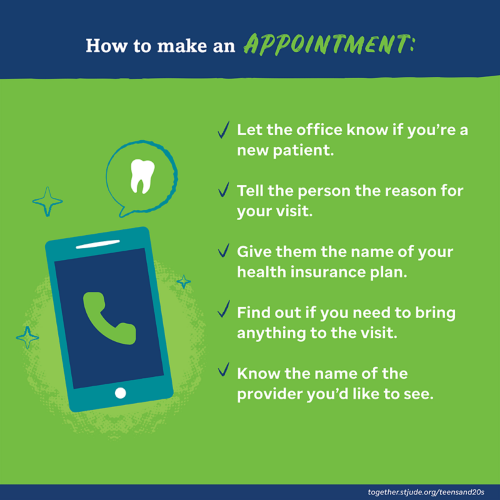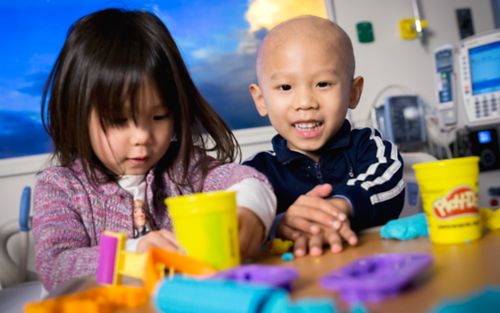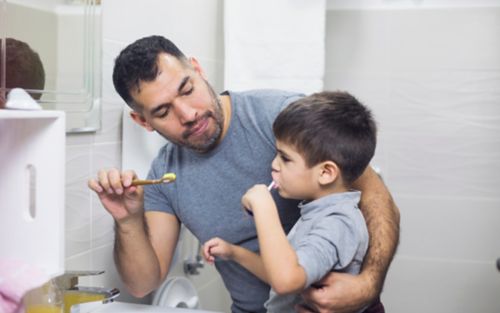You probably went to a pediatric dentist when you were younger. But at some point, often around age 18, you will start seeing an adult dentist. Changing from a pediatric dentist to an adult dentist can be confusing, especially if you have never made a dentist appointment on your own. It is normal to worry about what to expect.
Below are instructions to help you make a dentist appointment for the first time and get ready for your first visit.
If you do not already have a dentist, you can:
- Call your insurance provider (if you have dental insurance) and ask for a list of in-network dentists. Dental coverage may be covered in your health insurance plan or a separate dental plan.
- Talk to your pediatric dentist and ask for a recommendation. Ask your friends, family, and coworkers what dentist they go to.
- Search online for local dental offices. Be sure to read reviews.
Get ready to call the dentist’s office
You will want to have some things ready before you call the dentist. This will help you feel more confident and make it easier to schedule your appointment.
Have the following information ready when you call the office:
- Personal information
- Your full name
- Your date of birth
- Your contact information (your phone number, home address, and email address)
- A name and phone number for someone the dentist can call if there is an emergency. This person will be your “Emergency Contact.”
- Pediatric dentist information
- The name of any dentist or dental clinic you have been to in the past
- Contact information for the dentist (this is so you can get a copy of your dental records)
- Dental insurance information (if you have dental coverage)
- The name of your insurance plan
- Your insurance ID number
- Your group number (if your insurance card has one)
- What your insurance covers
- Medical history
- Any significant medical conditions, even if they are over (like cancer treatments or other serious illnesses)
- A list of any medicines you are taking
- A list of any allergies you may have
- Survivorship care plan (if you have one)
- The reason for your visit
- A regular checkup and cleaning
- A specific dental problem
- Preferred appointment times
- Days and times that work best for you
Call the dentist’s office
Once you have chosen a dentist, call the dentist’s office to schedule your appointment.
- Tell them you are a new patient and want to schedule an appointment. If you want to see a specific provider, be sure to give the name. You might say:
- “Hello. My name is ___. I am calling to make a dentist appointment.”
- Tell them why you want to see a dentist. You might say:
- “I need to get my teeth cleaned.”
- Answer any questions they have. They might ask:
- Do you have insurance? If so, with what insurance company?
- What is your phone number?
- When do you want to come in?
- Ask them how much it will cost.
- If you have insurance, you might ask, “How much is my co-pay?”
- If you do not have insurance, you might ask, “How much will I need to pay? When will I need to pay that?” “Are there any discounts available?”
- Write down the day and time of your appointment.
- The dentist’s office will probably tell you to get there early. Make sure you write that time down.
- Keep the note in a place that will help you remember your appointment.
- Write down the dentist’s address and phone number. This will help you remember where to go when it is time. It will also help you remember who to call if you have questions.
Get ready for your first visit
Before you go to your dentist appointment, make sure you:
- Have all of the paperwork you need.
- Insurance card
- Driver’s license
- Dental records
- List of current medicines
- Survivorship plan
- Know how you will pay for your visit. Bring a debit card, credit card, money, or health savings account card.
- Bring previous dental records or ask your pediatric dentist to send them to your new dentist.
- If you have records from your pediatric dentist, have them ready to share with your new dentist.
- Be sure to tell your dentist about any dental procedures, oral surgeries, or orthodontic care you had in the past.
- Write down questions.
- Write down any questions or concerns so you remember to ask your dentist.
- Talk about your medical history.
- Previous chemotherapy or radiation therapy can increase your risk of dental problems later in life.
- Some blood disorders or medicines can increase your risk of bleeding during dental procedures.
- Let your dentist know if you have a weak immune system or are at higher risk of infection.
Taking care of your teeth is important for your overall health. Healthy teeth help you look and feel better. They also allow you to eat, drink, talk, and smile. Regular dentist visits can help you keep your teeth and gums healthy.





